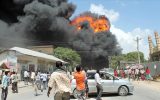The Presidential election has come and gone, but the details of the election has found its space in history unchallenged.
Prior to this year’s election #NigeriaDecides2019, the 2015 presidential election had the lowest figures as it relates to voters turn out, just 42% of Nigeria’s registered voting population came out to choose their leaders. The general expectation amongst Civil Society Organisations (CSOs) was that the figures would improve by the next election.
The militant and evangelical advocacy carried out by notable CSOs including YMonitor on voters’ education practically had little or no effect with regards to voters turn out on the day of the election. This is not to say that our collective efforts amounted to nothing, as we recorded a high level of awareness and involvement in the process. And if the numbers of those that registered are anything to go by, we might say that having 84 million Nigerians register to vote, is a considerable achievement.
| Elections | |||||||
| S/N | State | No. of Registered Voters | No. of Accredited Voters | Total Votes Cast | Total Votes Rejected | Voter Turn Out % | Vote Rejection % |
| 1 | Abia | 1,793,861 | 361,561 | 344,471 | 21,180 | 20 | 6 |
| 2 | Adamawa | 1,959,322 | 874,920 | 860,756 | 49,222 | 45 | 6 |
| 3 | Akwa Ibom | 2,119,727 | 695,677 | 605,140 | 26,365 | 33 | 4 |
| 4 | Anambra | 2,389,332 | 675,273 | 625,035 | 19,301 | 28 | 3 |
| 5 | Bauchi | 2,453,512 | 1,075,330 | 1,061,955 | 37,648 | 44 | 4 |
| 6 | Bayelsa | 923,182 | 344,237 | 335,856 | 14,089 | 37 | 4 |
| 7 | Benue | 2,391,276 | 786,069 | 763,872 | 34,960 | 33 | 5 |
| 8 | Borno | 2,319,434 | 987,290 | 955,205 | 35,419 | 43 | 4 |
| 9 | Cross River | 1,512,915 | 461,033 | 446,046 | 24,145 | 30 | 5 |
| 10 | Delta | 2,719,313 | 891,647 | 882,254 | 52,492 | 33 | 6 |
| 11 | Ebonyi | 1,392,931 | 391,747 | 379,394 | 20,263 | 28 | 5 |
| 12 | Edo | 2,150,127 | 604,915 | 599,228 | 38,517 | 28 | 6 |
| 13 | Ekiti | 899,919 | 395,741 | 393,709 | 12,577 | 44 | 3 |
| 14 | Enugu | 1,935,168 | 452,765 | 451,063 | 30,049 | 23 | 7 |
| 15 | FCT | 1,335,015 | 467,784 | 451,408 | 27,457 | 35 | 6 |
| 16 | Gombe | 1,385,191 | 604,240 | 580,649 | 26,446 | 44 | 5 |
| 17 | Imo | 2,037,569 | 585,741 | 542,777 | 31,191 | 29 | 6 |
| 18 | Jigawa | 2,104,889 | 1,171,801 | 1,149,922 | 43,678 | 56 | 4 |
| 19 | Kaduna | 3,861,033 | 1,757,868 | 1,709,005 | 45,402 | 46 | 3 |
| 20 | Kano | 5,391,581 | 2,006,410 | 1,964,751 | 73,617 | 37 | 4 |
| 21 | Katsina | 3,210,422 | 1,628,865 | 1,619,185 | 63,712 | 51 | 4 |
| 22 | Kebbi | 1,802,697 | 835,238 | 803,755 | 47,150 | 46 | 6 |
| 23 | Kogi | 1,640,449 | 570,773 | 553,496 | 32,480 | 35 | 6 |
| 24 | Kwara | 1,401,895 | 489,482 | 486,254 | 26,578 | 35 | 5 |
| 25 | Lagos | 6,313,507 | 1,196,490 | 1,156,590 | 67,023 | 19 | 6 |
| 26 | Nasarawa | 1,509,481 | 613,720 | 599,399 | 18,621 | 41 | 3 |
| 27 | Niger | 2,375,568 | 911,964 | 896,976 | 45,039 | 38 | 5 |
| 28 | Ogun | 2,336,887 | 613,397 | 605,938 | 41,682 | 26 | 7 |
| 29 | Ondo | 1,812,567 | 598,586 | 586,827 | 30,833 | 33 | 5 |
| 30 | Osun | 1,674,729 | 732,984 | 731,882 | 17,200 | 44 | 2 |
| 31 | Oyo | 2,796,542 | 905,007 | 891,080 | 54,549 | 32 | 6 |
| 32 | Plateau | 2,423,381 | 1,074,042 | 1,062,862 | 28,009 | 44 | 3 |
| 33 | Rivers | 3,215,273 | 678,167 | 666,585 | 24,420 | 21 | 4 |
| 34 | Sokoto | 1,895,266 | 950,107 | 925,940 | 54,049 | 50 | 6 |
| 35 | Taraba | 1,777,105 | 756,111 | 741,564 | 28,687 | 43 | 4 |
| 36 | Yobe | 1,365,913 | 601,059 | 586,137 | 26,772 | 44 | 5 |
| 37 | Zamfara | 1,717,128 | 616,168 | 597,224 | 18,785 | 36 | 3 |
| Sum | 82,344,107 | 29,364,209 | 28,614,190 | 1,289,607 | 36 | 5 |
In the last Presidential election, Nigerians just decided to stay back, do not be moved by the numbers you saw on your way to the polling unit. At the end of the day, when the numbers were counted, only 36% of the eligible voters decided who became the President of Nigeria!
This is unprecedented in the history of democracy in the country, worse than in 2015. Is it not an irony that Lagos, which has the highest number of registered voters, at the end of the election, had only 19 percent of that figure show up, making it the lowest in the country?
Kano was second in terms of the number of eligible voters, it fared better in the number of voters turnout – 37%. Jigawa registered the highest number of voters’ turnout, with what could be considered a stellar performance of 56%. Only three states had more than or exactly 50% of voters’ turnout, and the three are in the North. The rest were below, with a majority within the range of 30%.
Analyst are saying that the next election would be better, but we cannot be so sure of that. Prior to the 2015 election, we anticipated so much and when the mantra of change began, we felt that it was going to be the best election so far in terms of participation, not knowing we were in for surprises. No one could have anticipated that the 2019 figures would be lower than 2015, but here we are with an all-time low voters’ turnout in an election. Maybe we should stop being carelessly optimistic, maybe we should equally agree that if the necessary things are not done, 36% voters’ turnout may just be a better figure compared to what would come in 2023.
Every election in Nigeria is worth the effort. Since 1999, all the elections that we have had, have one peculiarity or the other that makes them sacrosanct; a river that need not be trivialized to get to the other side. Hence we are being reductionistic when we say that 2023 is what matters and by then we may have a better figure.
















